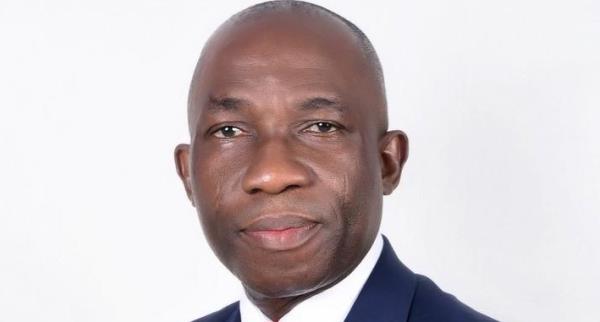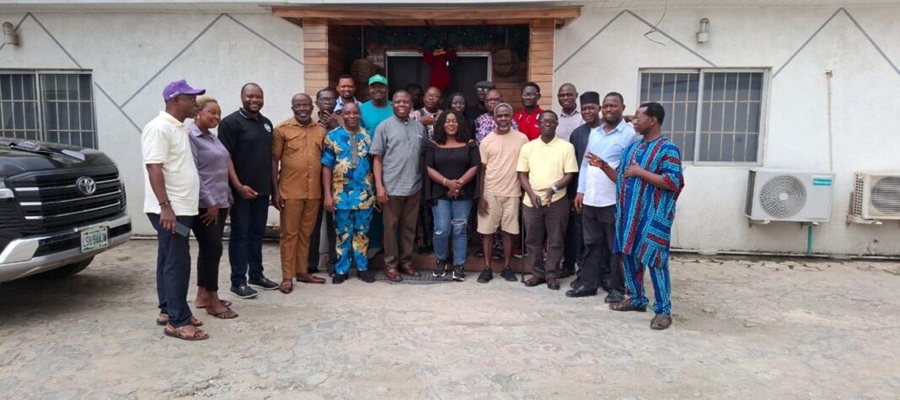Broadcasting
IP System Key to Unlocking Scientific Potential of Traditional Knowledge for Humanity – DG NCC

As the world commemorates this year’s Intellectual Property (IP) Day, Mr. John O. Asein, Director-General of Nigerian Copyright Commission (NCC), has declared that effective application of intellectual property could assist Nigeria to unlock the vast potentials of its traditional knowledge to empower more communities to become global players in the fields of science and medicine.

In a statement marking the World IP Day 2020 on 26th April, the NCC Director-General called on academics and researchers to explore and provide empirical, IP driven support to help refine, validate and propagate our traditional knowledge for the benefit of humanity.
X-raying the theme of the Day, “Innovate for a Green Future”, Mr. Asein stated: “The world can no longer ignore the consequences of unwholesome practices and innovations that threaten ecosystems, distort climatic conditions, deplete farm yields and foist untold hardship on people. The way out is to subscribe to environment-friendly innovation. This should be complemented by increased investment in green technology to achieve a low-carbon future for our world”.
He observed that the COVID-19 pandemic that has crippled virtually all sectors and industries has exposed the fragile ecosystem of the world in which we live, “and reminds us of the need to use technology, creativity and innovation in a balanced, responsible, human-friendly and sustainable manner”.
“It shows the vulnerability of developed and developing countries alike and how the choices made in one part of the world today could affect and shape our common destiny tomorrow”, he added.
According to him, “Despite the apocalyptic prognosis about the ongoing pandemic, the global response to it has been reassuring that humanity is able to use its collective power of creativity and innovation to overcome the challenge.
Here in Nigeria we are proud of the early indications of possible solutions in our traditional knowledge systems.”
The Director-General emphasised that Nigeria must harness its rich diversity of traditional knowledge, and through a careful infusion of the modern intellectual property system, provide both positive and defensive protection for its traditional knowledge.
He stressed that, with intellectual property, it could unlock its vast potentials and empower more communities to become global players in the fields of science and medicine.
The NCC DG indicated that the World Intellectual Property Organisation (WIPO) proclaimed 26 April yearly as a Day to raise awareness on the importance of IP – copyright, trademarks, patents and designs – and celebrate the contributions of creators and innovators.
He added that while humanity has benefited immensely from the advancements, it has also faced mounting challenges brought about as a by-product of those advancements.
“The depletion of the ozone layer, increasing global warming, acid rain, ocean plastic waste, water pollution, are some of these by-products that threaten humans, animals and the planet on which we coexist.
On the social spectrum, one may also worry about the ease with which fake and malicious news are digitally manipulated and circulated at the touch of a button. Such abuse of images and social media postings poses a threat to the integrity of traditional knowledge dissemination channels”, he remarked.
Observing that there was no better time than now for the world to appreciate the consequences of the daily choices we make in different areas of human life, Mr. Asein stated: “A green future should be one that also guarantees the protection of the nation’s biodiversity and the sustainable use of appropriate innovation, including traditional knowledge, to find simple, safe and sustainable solutions for daily challenges in health, wellbeing, food, shelter and environmental safety.
This would complement Government’s ongoing efforts at self-sufficiency and the vision for Nigerians to “grow what we eat and consume what we make”.
According to him, “The 2018 Global Innovation Index released by WIPO forecasts that by 2050, 85 percent of the world’s primary energy needs would be derived from renewables, such as solar, wind, and geothermal power.
“Countries are therefore encouraged to develop policies that support renewable energy. Fortunately, Nigeria is well endowed and it is already taking steps towards boosting the country’s performance index in the field of green technology.”
The Director-General urged everyone to embrace the campaign for a green future, adding that the Commission would continue to give institutional support as part of a national strategy for a balanced and robust intellectual property system that works for the wellbeing of the earth and the benefit of all.
“On this occasion of the 2020 World Intellectual Property Day, stay well, keep safe and have a wonderful celebration”, he stated.
Broadcasting
Tim Akano Recounts 20-Year Growth, Media Support at NITRA End-of-Year Meet

Mr. Tim Akano, New Horizons Chief Executive Officer, took centre stage at the Nigerian Information Technology Reporters’ Association (NITRA) annual end-of-year meeting on Thursday, December 18, 2025, recounting the company’s remarkable growth and reaffirming free IT training for journalists.

Tim Akano, New Horizons Chief Executive Officer, in a group photograph with NITRA Members
Speaking directly to IT media members at the company’s training facility in Lagos, Akano acknowledged the critical role journalists played in supporting New Horizons during its formative years two decades ago.
He detailed how the firm evolved from a handful of staff to one of Africa’s leading ICT skills training organisations, now employing about 500 staff across multiple training centres nationwide.
Akano Spotlights Youth Training, University Partnerships
Akano highlighted that New Horizons has trained over 500,000 youths, particularly tertiary institution students, equipping them with practical IT skills essential for Nigeria’s digital economy.
He announced recent partnerships with universities, including a new agreement with Afe Babalola University, to scale hands-on training programmes for students.
“This growth would not have been possible without the media’s support in documenting our journey,” Akano stated, pledging continued free IT skills training for media members to remain competitive in the evolving digital landscape.
Reciprocal Support Defines Long-Standing Partnership
The venue hosting the NITRA meeting underscored Akano’s generosity; NITRA Secretary Chidiebere Nwankwo secured the free facility after contacting him—a gesture consistent with New Horizons hosting multiple association events and training IT journalists since its inception 20 years ago.
Participants shared personal testimonies of Akano’s support, including veteran journalist Aaron Ukodie, whose daughter—an Accounting graduate from the University of Johannesburg—received NYSC placement and IT scholarship at New Horizons.
The Guardian’s Yemi Adeyemi recounted Akano accommodating his editor’s child for mandatory IT training after other firms declined.
Members praised Akano’s commitment to human capital development as evidence of deep appreciation for the media community that chronicled New Horizons’ success over two decades.
Broadcasting
NIMC rolls out Pre-Enrolment Portal for seamless NIN registration

National Identity Management Commission (NIMC) has launched the NIMC Pre-Enrolment Portal to revolutionise the National Identification Number (NIN) enrolment process, enabling applicants within Nigeria and in the Diaspora to capture biodata online prior to biometric verification at enrolment centres.

NIMC
Accessible via penrol.nimc.gov.ng, the platform allows users to fill enrolment forms, schedule appointments, upload supporting documents securely, and manage personal details directly, thereby slashing congestion, minimising wait times, boosting data accuracy and enhancing overall service efficiency at centres nationwide.
NIMC Director-General and CEO, Engr. (Dr) Abisoye Coker-Odusote, spearheaded the initiative as part of the Commission’s technology-driven strategy to fortify institutional performance, aligning with President Bola Ahmed Tinubu’s Renewed Hope Agenda that emphasises digital transformation, efficient public service delivery and inclusive national development.
Dr Kayode Adegoke, Head of Corporate Communications, highlighted key benefits including simplified biodata handling, confidential data protection through robust security measures, reduced physical centre visits and heightened operational effectiveness, urging all prospective enrollees to adopt the portal for a faster, citizen-friendly experience.[conversation_history]
The move underscores NIMC’s mandate under the NIMC Act No. 23 of 2007 to manage the National Identity Database, issue NINs and foster a reliable digital identity ecosystem vital for national planning, with users advised to complete pre-enrolment online before heading to selected centres for biometrics.
Broadcasting
MultiChoice Talent Factory Calls for Entries Into Fully Funded Film Training Programme

MultiChoice Talent Factory (MTF), a Pan-African film and television training institution, has announced the opening of applications for its 2026 intake.

MultiChoice
The fully funded programme is open to African graduates aspiring to become directors, filmmakers, scriptwriters, producers and storytellers.
According to MultiChoice, the nine-month accredited curriculum combines online learning with intensive in-person training, and is designed to balance theoretical knowledge with practical immersion.
MTF academies are located in Kenya, Nigeria and Zambia, and serve aspiring filmmakers from 14 African countries. Since its inception in 2018, the initiative has trained 296 filmmakers, with graduates producing more than 42 movies aired on DStv, GOtv and Showmax platforms.
Organisers said alumni of the programme have gone on to establish over 50 production companies, while many continue to work within the MultiChoice ecosystem.
Graduates have also won accolades at the Africa Magic Viewers’ Choice Awards, Kalasha Awards, Uganda Film Festival and Women in Film Awards.
Applications for the 2026 intake close on Feb. 27, 2026. Interested candidates can visit https://apo-opa.co/3XW53oE for programme requirements.

 General News3 days ago
General News3 days agoWoherem Proposes Pragmatic Roadmap to End Terrorism and Banditry in Nigeria

 News2 days ago
News2 days agoFIRS Declares NIN, CAC Numbers as Tax IDs from 2026

 E-Financial2 days ago
E-Financial2 days agoWorld Bank Reveals Obstacles to Growth of Mobile Money Accounts in Sub-Saharan Africa

 Telecom2 days ago
Telecom2 days agoNCC Ranked Among Top 3 MDAs for Best Website Performance in 2025

 Telecom1 day ago
Telecom1 day agoNigeria’s Internet Usage Hits 1.24m Terabytes – NCC

 E-Financial4 hours ago
E-Financial4 hours agoBanks quietly move to enforce new ₦50 transfer levy from Jan. 1

 General News4 hours ago
General News4 hours agoEcobank Guarantees Seamless Digital Banking Services Throughout the Christmas and Year-End Period




















